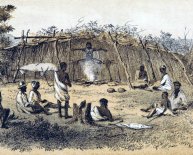
Australian Aboriginal Tribe names
In the reclaiming of heritages forcibly denied people as a result of conversion to Christianity and of government policies such as assimilation, many Indigenous people have rejected the names and naming of the colonisers. Thus 'Aborigines' is not used by many Indigenous Australians. However, because the Indigenous people of this country did not have a generic name for themselves, the expression 'Aboriginal and Torres Strait Island people' is an accepted generic expression. 'Indigenous Australians' is the other generally acceptable term.
Koori(e) is the term used by the Aboriginal people of the south-east of the continent, covering what is now called Victoria, New South Wales and southern Queensland. It is commonly spelt with an e in Victoria and without an e in New South Wales and southern Queensland. The term is not used by all Aboriginal people from the region. The word derives from the Awakabal language, from what is now the Newcastle region, meaning 'man' (see Australian National Dictionary, 1988, Oxford). Murri is the term used in the rest of Queensland, Nunga is used in South Australia and Nyoongah in the south-west of Western Australia. For Tasmanian Indigenous people, Palawa has become the accepted term.
As well, traditional tribal names show particular attachment to place. Thus Gunditjmara people are from what is now known as the Portland/Warrnambool district, while Yorta Yorta (sometimes written Jota Jota) people are river people in what is now referred to as the Echuca region. In northern Australia, where the process of colonisation is more recent, the use of tribal names is likely to be more continuous than in the south where cultures have been undermined through the establishment of missions and reserves in the late 19th and early 20th centuries. If you are unsure about how you should address people, you can ask, respectfully, what the preferred form of address is. This of course would be done before any Aboriginal person is introduced to the class.
Indigenous Australians is the preferred generic term for those Australians of Aboriginal or Torres Strait Islander heritage. Aboriginal people and Torres Strait Islanders can be used, but be aware that 'Aboriginal people' does not include Torres Strait Islanders. Terms such as 'Aborigines' or 'natives' are to be avoided. When referring to Australian Aboriginal people a capital A is always used. This shows a respect for the group being spoken about, just as we capitalise 'Italians' 'South Americans', 'Vietnamese' or any other ethnic group.
The term 'nation' is preferable to 'tribe' in describing a large community of common ancestry, language or history. While the two words had similar meanings, from the late 16th century they have taken different paths. With the rise of nation-states the word 'nation' has been glorified, while the word 'tribe' has been applied to belittle those other societies seen as primitive by the expansionist 'nations'.
The use of 'nation', as applied, say, to the Kulin nation in what is now Victoria, shows a preparedness to recognise that such a community had a dignity and an integrity which were dismissed by the colonists who judged the lack of houses or churches as a sign of inferiority. The Wathaurong, Woiwurrung, Boon Wurrung, Taungerong and Dja Dja Wurrung comprised the Kulin nation. The Kulin - separate groups which shared some language and cultural elements - lived in an area from Port Phillip Bay north to Euroa: from the Ballarat region in the west to the Mansfield region in the east. These groups comprising the Kulin nation in turn were made up of a number of clans (Presland 1994).
In the past, as a part of the process of control through colonisation, it was customary for people to be categorised according to a classification referred to in terms of 'blood'. 'Full bloods' were those people who had not intermarried with outsiders. They were easily distinguishable and, until the 1960s, were usually treated differently before the law. Others were variously referred to as 'half-castes', 'quarter-castes' and so on. Given that almost all people of Aboriginal heritage were treated by the colonists as having fewer human rights, and that it was nearly always their Aboriginal mother, not the European father, who brought up the child, the young ones grew up in an Aboriginal culture and it was this culture, not degrees of blood, which was passed down and which was how children were identified. Apart from being inaccurate, these terms are highly offensive to Indigenous people.
An understanding of the way language is used to express respect for the achievements of the dominant culture while subtly denigrating other social and cultural forms is a part of the process of removing the cultural blinkers and, in turn, building harmonious relations in a pluralist society.

















